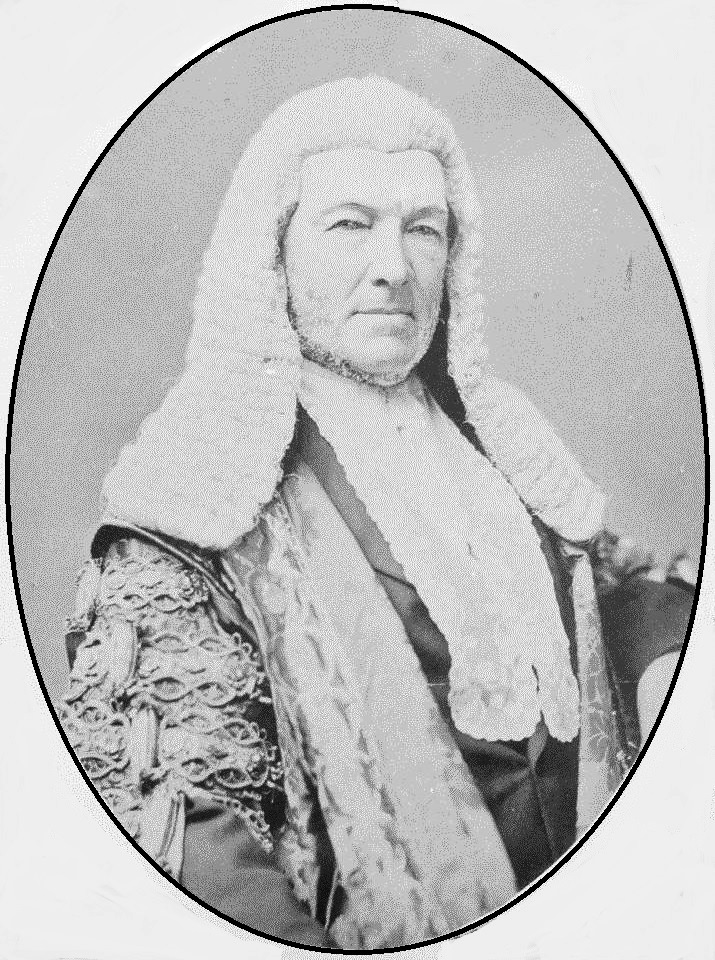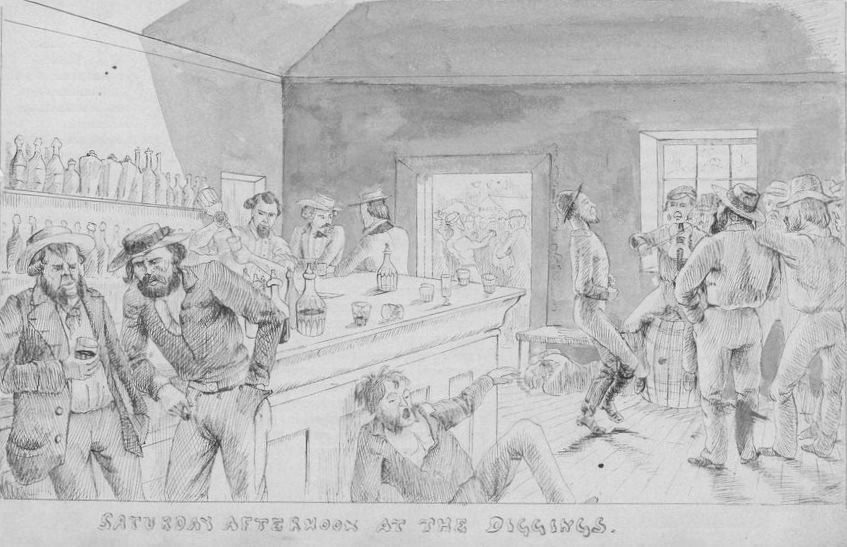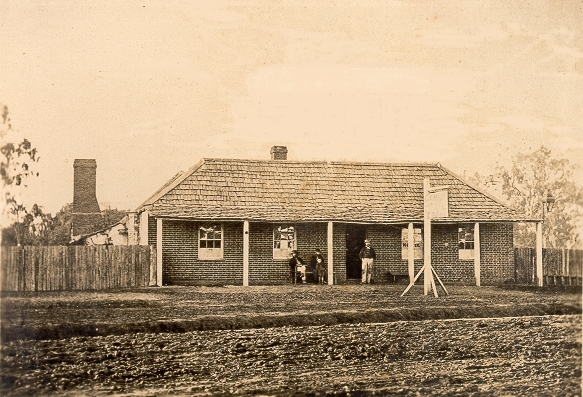Dr Francis Murphy was born in Cork, Ireland, in 1809 to public servant Francis Down Murphy and Mary (née Morris). He trained in the medical profession in Cork, Trinity College, Dublin, and London qualifying as M.R.C.S., in 1835. The next year he migrated to Sydney in where he was appointed by Governor Bourke as colonial surgeon to the Bungonia district of New South Wales in January 1837 at the age of only 27.
Murphy relinquished his medical career and became a successful farmer. He was a prominent member of the Goulburn community, acting as a magistrate on the Goulburn bench for eight years. Murphy married Agnes, daughter of Dr David Reid, in 1840 and in 1846 they followed Agnes’s brother David Reid jnr to Port Phillip where Murphy worked Reid’s Tarrawingee run until he was elected to the Legislative Council representing the Murray district. Tarrawingee was sold in 1853 and the Murphy family moved to Collingwood. Murphy was a very influential man in the Wangaratta district in the 1840s, including being a Justice of the Peace. His connections gave him a power that few other men had. Hence, when Murphy complained about something, people in Melbourne listened.
The following is an annotated transcript of a letter written by Murphy in December 1849 to the Colonial Secretary complaining about the lawlessness and lack of police in Wangaratta. I wish Murphy had been a little more descriptive about the “scenes of riot and debauchery”!
Sir, I extremely regret, that I feel it to be my duty once again to bring under your Honours’ notice the lawless state of the township of Wangaratta, and the want of police protection in the district immediately surrounding it, and to express my conviction that sooner or later, some fatal occurrences will be the result of the present unchecked scenes of riot and debauchery which daily occur.
It is interesting to note that this was not Murphy’s first complaint about the lack of a police presence in the town.
Owing to the circumstance of this being the only township in these districts where no police are stationed, it has followed that the idle and disorderly, far and near, congregate here, and I am constantly receiving complaints from the residents of outrages committed upon them both in person and property and which I am wholly unable to take notice of, through want of the necessary means of redress.
These scenes are interesting as the discovery of gold at Beechworth was over two years away so these trouble makers weren’t fresh from the goldfields and flush with money. Most of them were probably ex-convicts from New South Wales, moving away from areas where they would be under easy surveillance, as Murphy pointed out.
The above image, while probably sketched around Victoria’s central goldfields gives an idea of what was going on in the pubs on a good day.
The publicans have frequently stated to me their inability to prevent the hordes of drunkards, which are always to be found upon their premises and about them, and I know that they have upon several occasions been subject to great violence with serious damage to their homes and persons in their efforts to keep disorderly people away and to suppress outrage.
William Henry Clark’s Hope Inn was operating at this time. Thomas Bond’s Travellers’ Inn was on Sydney Rd (now Ryley St) and James Melville held the Wangaratta Hotel on the north bank of the Ovens. There may have been two other hotels in the town that I’ll post about another time.
It is but a few days back that one of the innkeepers had a narrow escape from being shot by a scoundrel who put a loaded pistol to his breast and snuffed it when it providentially missed fire. The pistol was loaded with ball and went off the second time in the hands of the innkeeper who wrested it from his antagonist. Upon this occasion I had the police sent for, from the Broken River [Benalla], some 40 miles off, but before their arrival, which always takes place after a most leisurely interval, the thing was well known, and of course the offender was out of the way. The police made, as usual, a careless and ineffectual search, returning to their quarters the following day, and thinking no more of the matter, and when their backs were about, the man I am told reappeared. And I have every reason to believe from the reports I have heard, that he will again attempt the life of the publican. The latter’s offense appears to be, that he gave some information about a robbery which there is no doubt this villain had committed a few days before, as the stolen property was found by some blacks near his hut.
I would really like to know who this poor terrified innkeeper was. I’ve found no reports of this incident in newspapers, although coverage was sparse at this time, and police gazettes revealed nothing. It seems appalling that the ‘villain’ wasn’t apprehended and that the event and victim’s name have disappeared from the record.
Yesterday I was waited upon by Mr Gemmell, a medical practitioner at Wangaratta, who informed me that his house had been attacked in his absence by some drunken fellows, who broke in his windows in the face of his wife, a lady at the time in a very delicate state of health, and he describes the place (the township), to use his own words ‘as a Hell upon earth’ where it is becoming utterly impossible for any decent person to live.
Dr Murphy didn’t take the advice of Dr Gemmell merely because he was a fellow medical practitioner and therefore respectable. The two doctors had other connections that show them to be more than mere acquaintances. They owned land in Melbourne next to each other and both had political aspirations amongst other things. Murphy’s mention of Dr Gemmell’s wife being “in a very delicate state” was a term commonly used for pregnancy. Maria Caroline Nash (nee Winnington) Gemmell was barely 21 years old at the time of these attacks, and pregnant with her first child John Gemmell junior and as Murphy reported, was alone in the house. Gemmell’s house may have been targeted as it had real glass windows which were expensive and signalled a relatively wealthy person lived there.
He says that drunken people are frequently about stark naked in the day time, and that all kinds of rioting and blasphemy exist from one weeks end to another. As Mr Gemmell is I believe, about going to Melbourne I have recommended him to wait upon your Honour and represent the state of the place of which he is a constant eye witness.
I can’t say much more about people swanning around the streets of Wangaratta in drunken stupors and stark naked except that I wish Murphy had named names!
There are now considerably upwards of two hundred person living at ‘Wangaratta’ and many houses of brick and wood are built and are in course of erection.
Dr Murphy uses ‘Wangaratta’ as the town was named only in the April of 1849, previously being known as the Ovens Crossing Place. His mention of the housing stock indicates that for the past 12 years accommodation had largely been temporary with tents and bark huts the norm. Wood and brick buildings were signs of establishment and that people were prepared to invest in the future of the town. Murphy clearly thought the town had potential if only it had adequate policing.
I would strongly, but respectfully, press these statements upon your Honour’s attention, with the view of urging your Honour to take whatever step your Honour may deem requisite in the matter and that be in your Honour’s power.
And I have the honour to be your Honour’s most obedient humble servant.
Francis Murphy JP
If you have any stories of crime and police in early Wangaratta I’d love to hear from you.
https://www.pinterest.com/jenealogy7/wangaratta-history/








It’s sad that every human being isn’t born with an inbuilt moral compass but that society has to depend on some form of control to try and keep everyone safe. You have painted the picture very vividly.
Thanks for dropping by! It’s unfathomable really. I have contemplated the statements in the letter many times and can only put it down to the convict culture – not to say all convicts were like that of course – and the distance from any watchful eye. And of course my own ancestor contributed by being one of perhaps five publicans in a tiny town.
Love these stories of early Wangaratta. This is what the Vincent family arrived to, c1846 – and they moved into Wangaratta to escape the lawlessness of the surrounding districts!
It’s hilarious but frightening at the same time Katrina. Goodness knows what the surrounding districts were like if the Vincents thought the town was a safe place! Maybe they thought there was safety in numbers in the town. It took me a while to accurately transcribe the letter and for a while I was stuck at “He says that drunken people are frequently about **** **** in the day time”. I nearly fell off my chair when I realised the missing words were “stark naked”. I was trying to imagine every other thing that drunks could have been doing but never thought of that one!
My ancestor Dominick Farrell came down to manage the southern half of Oxley Plains when it was split as a consequence of new leasing regulations in 1848. Clearly a lot quieter at Edi – until the stock ‘rustling’ from 1857 with Bogong Jack and then the miners in 1862.
Hi Michael,
Yes I think the out lying areas had a different type of ‘excitement’. Probably drunken naked people would have been preferred over bushrangers though!
Thanks for dropping by. 🙂
Hi again Michael,
Was the run that Dominick Farrell managed the section of Oxley Plains known as Ten Mile Hollow ?
Yes. Dom bought the run for 5000 pounds in 1857. 3000 down and paid it off several years later. I think Catarrh was an issue and then the rustlers/miners. You wanted to be far enough away to avoid pilfering but close enough to make a fortune selling beasts to the butchers on the goldfields. Your information on John Moore was very helpful. I believe Moore went on to manage the Whorouly Station for George Mackay, who would have been aware of his capabilities.
Hi Michael, That’s a very significant amount Dominick paid for the run so he was doing very well for himself. The connections, crossovers and coincidences between your family and my Margaret Considine make me wonder if they knew each other back in Ireland. Or perhaps in the colonies they sought out fellow countrymen or merely met each other through work e.g. the Faithfull and Goulburn connections. Do you know where in Ireland Dominick came from? I’ll also send you and email so we can keep chatting.
From memory it was originally Ten Mile Creek, then Running Creek and Black Range Creek. It was the valley that Edward (Edmund) Bourke tried to travel up, to take up land at Degamero, before back tracking and more modestly settling at Daisy Park (700-800 acres). Bourke and Farrell knew each other from Lake Bathurst when working at Springfield Station, south of Goulburn. Bourke’s wife was Isabella Hart (m. 1852, nee Kelly), the aunt of Ned Kelly. Her first husband was also a mate of Dominick, Patrick Hart (m. 1844), both being assigned servants to William Pitt Faithfull, the owner of Springfield. They had built a Catholic Church at Ryansvale (on the Springfield Estate).